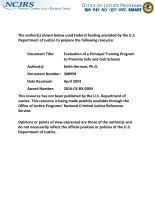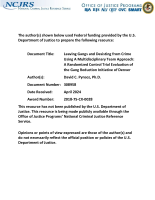Program design
Guidelines for Developing, Implementing, and Revising an Objective Prison Classification System
Improving Evidence Gathering Through a Computer-Assisted Case Intake Program: Final Report
Improving Evidence Gathering Through a Computer-Assisted Case Intake Program: Executive Summary
Victims - Crime File Series Study Guide
Pretrial Decisions - A Contextual Analysis of Central Intake Systems
OPT2 - An Interactive Computer Program for Conducting Bayesian Hypothesis Tests
Complexities of Victim Research: Implementation Lessons from the Victim Impact Evaluation of Nonprofit Victim Services in the STOP Program
Developing Private Sector Prison Industries: From Concept to Start Up
Preliminary Process Evaluation: 4-H Mentoring/Youth and Families with Promise (YFP) Program
Structured Geographic Data Base Design To Support the Resource Allocation Problem for Police Departments
Enhanced Ignitable Liquid and Substrate Database Functionality for Improved Casework and Research
Impact Evaluation of Complementarities Between PBIS and Restorative Justice
Advancing Denver’s Handgun Intervention Program through Action Research
Just Science Podcast: Just Outreach Teams for Substance Use in Rural Nevada
Strengthening Understanding of Peer Programs to Optimize Resources & Training (SUPPORT): Identifying critical elements of police peer support across career stages
Early Intervention for Victims of Crime: Evaluation of Skills for Psychological Recovery
Assessing the Impact of an Innovative Response to Intimate Partner Violence Related Strangulation, Final Report & Outcome Evaluation
Just Science Podcast: Just Improving Forensic Toxicology Testing In DC
Restoring Promise
Positive research results from a program that aims to transform correctional culture.
Evaluation of a Principal Training Program to Promote Safe and Civil Schools
Leaving Gangs and Desisting from Crime Using a Multidisciplinary Team Approach: A Randomized Control Trial Evaluation of the Gang Reduction Initiative of Denver
Webinar Transcript: NIJ FY 2024 Research and Evaluation on Youth Justice Topics
This webinar will provide an overview of the NIJ FY 2024 Research and Evaluation on Youth Justice Topics solicitation. In collaboration with the Office of Juvenile Justice and Delinquency Prevention, NIJ seeks applications for research and evaluation projects that inform policy and practice in the field of...






